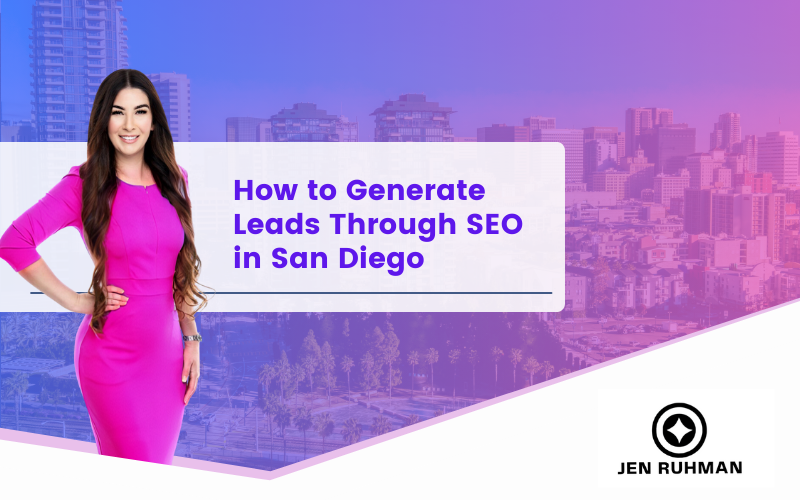
Jan 9, 2025 | ChatGPT, PR, SEO Tips

Scaling a startup in San Diego isn’t just about having the best product or service; it’s about getting found by the right audience. That’s where search engine optimization (SEO) comes in. As the owner of an SEO company here in San Diego, I’ve seen firsthand how local startups can transform their visibility and lead generation using the right SEO strategies. Let me walk you through how it’s done.
Why SEO is a Game-Changer for San Diego Startups
SEO isn’t just a buzzword; it’s a necessity. San Diego is a hub for tech startups, which means competition is fierce. When your potential customers search for solutions online, SEO ensures your business is front and center. Without it, even the most innovative startups can remain invisible.
Understanding the Basics of SEO
What is SEO?
SEO is about optimizing your website so search engines like Google can understand, rank, and display it when people search for specific terms. Think of it like creating a digital roadmap for search engines to find you.
The Core Components of SEO
- On-Page SEO: This includes optimizing your content, meta tags, and headings.
- Off-Page SEO: Building backlinks and creating authority through partnerships and mentions.
- Technical SEO: Ensuring your website loads fast, is mobile-friendly, and has proper indexing.
How San Diego Startups Can Leverage SEO
1. Focus on Local SEO
San Diego is your home turf. Use it to your advantage. Claim your Google My Business profile, optimize it with keywords, and encourage reviews. Include location-specific keywords like “tech startups San Diego” or “San Diego app developers” throughout your website.
Personal Tip: I once helped a small fintech startup optimize their Google My Business page, and within two months, their local traffic doubled. It was all about dialing in those local search terms and reviews.
2. Create Targeted Content
Your content should address your audience’s specific needs. Think blog posts, case studies, and how-to guides.
Topics to Cover
- Industry-specific challenges
- Trends in tech or innovation
- “How-to” guides for your target customers
Example: A SaaS company I worked with created a blog series answering FAQs their sales team kept hearing. Not only did traffic spike, but their inbound leads increased because they were answering questions potential clients had.
3. Nail Your Keywords
Keywords are the foundation of SEO. Use tools like Google Keyword Planner or SEMrush to find phrases your audience searches for.
Focus on Long-Tail Keywords
These are specific phrases, like “best cybersecurity startups in San Diego.” They have lower competition but attract more qualified leads.
4. Build High-Quality Backlinks
Backlinks are like votes of confidence for your website. Partner with local organizations, get featured in industry blogs, and engage with local media outlets to earn links back to your site.
Pro Tip: I once connected a startup with a local business journal, leading to a featured article and a high-authority backlink. Their domain authority shot up, and so did their traffic.

5. Optimize for Mobile
Over 50% of internet users access sites via mobile devices. Your website needs to load quickly and look great on any screen size.
Checklist for Mobile Optimization
- Fast load times
- Easy-to-read fonts
- Clickable buttons and links
Common SEO Pitfalls to Avoid
1. Ignoring Analytics
If you’re not tracking your efforts, you’re flying blind. Use tools like Google Analytics to measure what’s working and adjust accordingly.
2. Stuffing Keywords
Overusing keywords looks spammy and can hurt your rankings. Always prioritize natural, readable content.
3. Neglecting User Experience
Search engines prioritize user experience. If your site is hard to navigate, your rankings will suffer.
How to Measure SEO Success
Key Metrics to Watch
- Organic Traffic: Are more people finding your site?
- Bounce Rate: Are visitors staying on your site or leaving immediately?
- Keyword Rankings: Are you climbing the search engine results for target keywords?
- Conversions: Are visitors turning into leads or customers?
Why You Should Start Today
SEO is a long game, but the rewards are worth it. The sooner you start, the sooner you’ll see results. Plus, SEO builds over time, creating a foundation for sustained growth.
Scaling a startup in San Diego takes more than hard work and a great product. It takes visibility. SEO is the tool that ensures your audience knows who you are and what you offer. With the right strategy, your startup can not only compete but thrive in San Diego’s competitive landscape. If you’re ready to take your SEO to the next level, I’m here to help.
Schedule a free consultation today! Call or text (619) 719-1315.

Jan 9, 2025 | ChatGPT, SEO, SEO Tips

As someone who runs an SEO company in San Diego, I’ve seen firsthand how artificial intelligence (AI) is reshaping the SEO landscape. It’s exciting, but let’s be honest—it’s a little overwhelming too. Tools like ChatGPT and Bard (aka Gemini have revolutionized how we approach content creation, keyword research, and audience analysis. If you’re looking to stay ahead in this rapidly changing field, buckle up, and let me guide you through the strategies you need.
The Role of AI in Modern SEO
What Is AI’s Role in SEO?
AI is like having a digital assistant who never sleeps. It analyzes patterns, predicts trends, and optimizes processes that used to take hours (or even days) to do manually. Whether it’s generating topic ideas, analyzing competition, or fine-tuning technical SEO, AI is the backbone of modern strategies.
My Journey with AI Tools
I’ll admit, when I first tried AI tools like ChatGPT, I was skeptical. How could a machine truly “understand” what makes content engaging? But after using it to brainstorm keywords for a local restaurant client, I was hooked. Not only did it save time, but it also uncovered opportunities I hadn’t even considered.
AI Tools That Are Game-Changers
ChatGPT for Content Creation
ChatGPT has become my go-to for generating engaging, SEO-optimized content. It’s particularly helpful when I’m drafting blog posts or rewriting web pages. For example, I used it to help create a 2,000-word guide for a San Diego real estate client, packed with keywords and valuable insights.
Gemini (formerly known as Bard) for Keyword Research
Google’s Gemini currently as of Jan 2025 (formerly known as Google Bard) Gemini is a powerful ally for keyword research. I recently used Bard to help a local moving company identify high-volume, low-competition keywords. Within weeks, their website started climbing search engine rankings.
Surfer SEO and Other Integrations
Pairing AI with tools like Surfer SEO ensures that every piece of content aligns with search intent and current ranking factors. These integrations provide real-time recommendations, like tweaking headings or adding more authoritative links.

How AI Simplifies Keyword Research
Finding Long-Tail Keywords
AI doesn’t just find keywords—it finds the right keywords. Tools like ChatGPT can generate long-tail keywords tailored to local searches, like “best tacos in San Diego Gaslamp Quarter.”
Predicting Search Trends
AI is great at predicting emerging trends. For example, I noticed a rise in searches for “eco-friendly moving services” and used AI insights to guide my client’s content strategy. This proactive approach set them apart from competitors.
Personalized Content at Scale
Why Personalization Matters
Generic content doesn’t cut it anymore. AI helps me craft highly personalized, location-specific content that resonates with readers. When working with a San Diego medspa client, I used AI to identify the most-searched treatments in different neighborhoods, ensuring every blog felt locally relevant.
Automating Content Creation
AI tools can produce high-quality content drafts in minutes. While I always edit to maintain a personal touch, AI helps streamline the process so I can focus on strategy.
Technical SEO Made Easy
Fixing Common Website Issues
AI-powered tools like Screaming Frog and SEMrush identify broken links, slow-loading pages, and other technical issues in seconds. This saves countless hours of manual audits.
Enhancing User Experience
AI helps optimize website layouts, mobile responsiveness, and navigation. I’ve used AI insights to redesign a client’s site, cutting bounce rates by 40%.
Local SEO and AI
Optimizing for San Diego Searches
Local SEO is my bread and butter, and AI tools make it easier than ever to dominate local search results. For instance, I’ve used AI to fine-tune Google My Business profiles for San Diego-based clients, ensuring their listings rank for “near me” searches.
Geotargeted Content Strategies
AI can analyze local search data to uncover what topics resonate with your target audience. Whether it’s surf lessons in Pacific Beach or the best vegan spots in Hillcrest, AI ensures your content hits the mark.
FAQs
Q1: Can AI replace an SEO expert?
No, AI is a tool that enhances what SEO experts do. It streamlines processes but still requires human creativity and strategic thinking.
Q2: How do I choose the best AI tool for SEO?
Start with versatile options like ChatGPT for content creation and Bard / Gemini for keyword research. Experiment and see what aligns with your needs.
Q3: Does AI work for small businesses?
Absolutely. AI is perfect for small businesses looking to optimize their SEO without a huge budget.
Q4: What’s the biggest challenge with AI in SEO?
Ensuring the content feels authentic and resonates with the audience. AI-generated drafts need editing for a personal touch.
Q5: How do I start using AI for SEO?
Begin with free tools like ChatGPT or trial versions of premium software like Surfer SEO. As you get comfortable, expand your toolkit.

Staying Ahead of AI Trends
Continuous Learning
The SEO world is constantly evolving, and so are AI tools. I dedicate time each month to testing new features and updates, ensuring my strategies are cutting-edge.
Collaboration, Not Replacement
AI won’t replace human creativity—it enhances it. My most successful campaigns blend AI-driven insights with a human touch.
AI is a game-changer for SEO in San Diego. It streamlines processes, uncovers new opportunities, and keeps us ahead of the curve. But remember, the key to success is combining AI’s efficiency with your unique expertise and creativity. If you’re ready to elevate your SEO strategy, let’s connect—I’d love to help you navigate this exciting new landscape.
Schedule a free consultation today! Call or text (619) 719-1315.

Nov 19, 2024 | links, SEO Tips
You need local citations for your business to help your SEO.
So, I put together this FREE massive list of places online where you can get free local business citations.
You can give this list to an employee to do or hire someone such as myself to knock this out for you fast!

- With a strong backlink profile and your NAP (name address phone number) consistent across the internet.
- Copy and paste your information into a notepad and make sure you’re using consistent references such as “St.” instead of Street.
- Include as much information as possible – if the directories allow you to upload your logo, specify your social media accounts, a description of your business, etc. Do IT!
PRO Tip: Create a “junk email” in outlook and save the login information. Keep a consistent log of logins for each citation site below in a spreadsheet. This is in case you need to change your phone number (which you should never change) The reason I recommend a junk email is because these directories will blow up your inbox with advertisements and promotions. Thank me later. 🙂
BIG List of 375 Local Citation Sites for Your Business:

Nov 19, 2024 | SEO Tips

As the owner of an SEO company in San Diego, I’ve had my fair share of conversations with stakeholders who want to know: “How is SEO going to impact our bottom line?” It’s a fair question, and one I love answering because it shows they care about results. Explaining the return on investment (ROI) of SEO can seem difficult and overwhelming, but when broken down step-by-step, it becomes clear and convincing.
Let’s walk through how I break this down for clients and stakeholders.
What is SEO ROI?
At its core, SEO ROI measures the return you’re getting from the investment you’ve made in search engine optimization efforts. It’s not just about rankings or traffic—it’s about how these efforts contribute to actual revenue and growth.
Why is Explaining SEO ROI Important?
- Building Trust: Showing stakeholders how SEO ties directly to revenue builds credibility.
- Securing Budget: A clear ROI explanation can secure more investment in future SEO projects.
- Demonstrating Value: Stakeholders need to see that SEO is more than a cost; it’s a strategic growth driver.
When stakeholders see the bigger picture, they become allies in your SEO efforts.
The Challenges of Explaining SEO ROI
Time Lag in Results
SEO isn’t like running a paid ad—it takes time to see results. Explaining this can be tricky, but framing it as a long-term investment helps.
Attribution Complexity
What happens when someone finds your site through organic search but doesn’t convert until they see a remarketing ad later? Explaining these nuances is key to understanding SEO’s real impact.
Step-by-Step Guide to Explaining SEO ROI
Start with the Basics
When I meet with clients, I start by explaining what goes into SEO—keyword research, on-page optimization, technical fixes, and link building. Stakeholders need to understand that SEO is a multi-faceted process. SEO IS NOT EASY and it is NOT a ONE one-time purchase.
Define Clear Goals
For one of my e-commerce clients, we defined clear KPIs:
- Increase organic traffic by 30% within six months
- Boost conversions from organic traffic by 15%
Defining goals aligns expectations.
Show the Metrics That Matter
I always focus on metrics that stakeholders care about, like:
- Organic traffic growth
- Lead generation or sales
- Cost per acquisition (CPA)
- Revenue generated from organic traffic
For example, I showed one client how their $5,000 monthly investment in SEO resulted in $25,000 in sales—an ROI of 400%.
Use Real Data
One thing I’ve learned? Real data speaks louder than theoretical projections. I pull reports from tools like Google Analytics and Google Search Console to show:
- How traffic has improved over time
- Which keywords are driving conversions
- What pages are performing best
Explain the Bigger Picture
SEO isn’t just about today’s results—it’s about building a foundation. I explain how high-ranking content continues to bring traffic (and sales) months or even years after it’s published.
Tools to Measure SEO ROI
Google Analytics
This is my go-to tool for tracking organic traffic, conversions, and revenue.
Google Search Console
It provides insights into impressions, clicks, and keyword performance.
CRM Tools
Integrating with customer relationship management (CRM) tools can help show how organic leads move through the sales funnel.
Addressing Stakeholder Concerns
“Why Isn’t It Working Yet?”
SEO takes time. I compare it to planting a tree—it takes nurturing, but once it grows, it provides shade for years.
“How Do We Know It’s SEO?”
Attribution can be tough, so I explain how we track specific landing pages and keywords to tie results directly to SEO efforts.
Using Case Studies to Prove ROI
Whenever I can, I share real-world examples. For instance, a local San Diego business increased their organic traffic by 50% in six months, which resulted in a 20% increase in overall revenue. Stories like this make the results tangible.
Personal Anecdote: My Favorite SEO Win
One of my proudest moments was working with a struggling small business. They had an outdated website and were skeptical of SEO. After six months of targeted work, they were ranking on the first page for several competitive keywords. The owner called me one day and said, “Jen, we just had our best quarter ever.” That’s what SEO can do.
Wrapping It Up
Explaining SEO ROI to stakeholders isn’t just about numbers; it’s about telling a story. By walking them through the process, showing real results, and addressing concerns, you can turn skeptics into believers.
FAQs
1. How long does it take to see SEO ROI?
Typically, SEO takes 4-6 months to show significant results, though it depends on competition and industry.
2. What’s the best metric to track for SEO ROI?
Revenue generated from organic traffic is the most impactful, but other metrics like leads and traffic also matter.
3. Can SEO guarantee ROI?
While no one can guarantee results, a well-executed strategy has a high chance of delivering positive ROI.
4. Why does SEO take so long?
SEO involves building authority and trust with search engines, which requires consistent effort over time.
5. What’s the biggest mistake when explaining SEO ROI?
Focusing too much on technical jargon instead of linking SEO efforts to business outcomes.
Showcasing SEO ROI: Build Stakeholder Confidence and Drive Growth
Explaining SEO ROI doesn’t have to be a challenge. By breaking it down step by step and focusing on metrics that matter to stakeholders, you can clearly demonstrate the value of SEO and its long-term impact on your business. From setting clear goals to using real data, these strategies help bridge the gap between SEO efforts and measurable business outcomes.
As the owner of a San Diego-based SEO company, I’ve guided countless businesses in showcasing their SEO success to stakeholders, helping them secure buy-in and drive growth. Let’s work together to create a strategy that not only delivers results but also tells a compelling story of success.
Ready to make your SEO efforts stand out? Schedule a free consultation today! Call or text (619) 719-1315.
Let’s show your stakeholders the true power of SEO.

Nov 19, 2024 | SEO Tips

As the owner of an SEO company here in beautiful San Diego, I know firsthand how powerful search engine optimization can be for generating leads. Whether you’re a small local business or a larger enterprise, SEO has the potential to transform how you attract and connect with customers. In this article, I’ll share my tried-and-true strategies for leveraging SEO to generate leads, with a personal touch to help you see how these methods can work for your business.
What Is SEO and Why Does It Matter for Lead Generation?
Understanding SEO Basics
SEO, or search engine optimization, is all about making your website more visible in search engines like Google. When someone in San Diego searches for your services, you want your business to be at the top of the results. More visibility equals more traffic, and more traffic means more potential leads.
Why SEO Is Crucial for San Diego Businesses
San Diego is a competitive market. From beaches to tech hubs, businesses across industries are vying for attention. If your website isn’t optimized, you’re missing out on people actively searching for what you offer.
How to Get Started with SEO for Lead Generation
Set Clear Goals
Every successful SEO campaign starts with a goal. Are you aiming to increase traffic by 20%? Generate 50 new leads per month? Defining your target helps shape your strategy.
Personal Tip: When I first started working with local coffee shops, our goal was to rank for “best coffee shop in San Diego.” That one keyword brought them dozens of new customers weekly.
Perform Keyword Research
Keywords are the backbone of SEO. Tools like Google Keyword Planner or SEMrush can help you find terms your customers are searching for. Look for local intent keywords like “San Diego [your service]” or “near me” searches.
Optimize Your Website
Create Targeted Landing Pages
One of the best ways to generate leads is to have pages specifically designed for the services or products you offer. For example, if you’re a plumber in San Diego, create a landing page for “Emergency Plumbing Services in San Diego.”
Mobile-Friendly Design
With so many people browsing on their phones, a mobile-optimized site isn’t optional. I’ve seen businesses lose out simply because their websites were hard to navigate on a smartphone.
Local SEO Essentials
Make sure your business name, address, and phone number (NAP) are consistent across directories. Claim your Google My Business listing and encourage customers to leave reviews.
Leverage Content Marketing
Blog About Local Topics
Writing about local events or trends in San Diego can drive traffic. For instance, I’ve written blogs for my clients about everything from “Top 10 San Diego Beaches” to “How to Prepare for Wildfire Season in San Diego.” These topics bring relevant traffic and potential leads.
Use Video Content
People love video. Showcase your expertise with tutorials or testimonials from happy clients. A video titled “How We Helped a San Diego Business Triple Their Leads” would be a hit.
Build Backlinks Strategically
Partner with Local Organizations
One strategy that’s worked for me is collaborating with San Diego-based organizations. For example, sponsoring local events or partnering with nonprofits can earn you backlinks from their websites.
Write Guest Posts
Offer to write articles for popular San Diego blogs or news sites. This not only boosts your SEO but also positions you as an authority in your industry.
Measure Your Success
Track Key Metrics
Use tools like Google Analytics to monitor website traffic, bounce rates, and conversions. Knowing what’s working helps you refine your strategy.
Adjust as Needed
SEO isn’t static—it evolves. Regularly revisit your keywords, content, and strategies to keep up with trends and algorithm updates.
The Importance of Patience
SEO takes time. I always remind my clients that while paid ads bring quick results, SEO is a marathon, not a sprint. But the payoff? Consistent, high-quality leads that don’t break the bank.
Why Work with a Local San Diego SEO Expert?
Ready to elevate your online presence and generate consistent leads in San Diego? Don’t miss the chance to dominate local search results and drive measurable growth for your business. Let’s discuss your unique needs and craft a tailored SEO strategy that delivers results.
As the owner of a San Diego-based SEO company, I’ve spent years perfecting strategies that help businesses like yours succeed in this vibrant, competitive market. From local keyword targeting to optimizing your website for conversions, I’m here to help your business shine.
Ready to take your SEO to the next level?
Schedule your free consultation today! Call or text (619) 719-1315.
Let’s work together to make your business stand out and thrive in San Diego.
FAQs
1. How long does it take to see results from SEO?
Typically, you’ll start noticing changes within 3-6 months, but it can take longer for highly competitive keywords.
2. What are local keywords, and why are they important?
Local keywords include terms like “near me” or specific locations (e.g., “San Diego”). They help you connect with customers in your area.
3. Do I need a blog for SEO?
While not mandatory, a blog can significantly boost your SEO by keeping your site fresh and targeting additional keywords.
4. How much should I budget for SEO?
Costs vary depending on your goals and industry. A local SEO campaign can range from $500 to $5,000 per month.
5. Can I do SEO myself?
Yes, but it requires time and expertise. Hiring an expert ensures your strategy is effective and up-to-date.

Nov 17, 2024 | SEO Tips

In today’s digital landscape, SEO (Search Engine Optimization) is not just a buzzword—it’s a lifeline for businesses. I’ve seen firsthand, through my work with clients at Jen Ruhman SEO, how impactful a strong SEO strategy can be. In 2025, SEO is more crucial than ever. Let me share why.
The Evolving Nature of Search Engines
AI-Powered Search Algorithms
Search engines like Google are smarter than ever. AI-powered algorithms now interpret intent rather than just keywords. This means SEO isn’t just about stuffing pages with phrases—it’s about creating content that truly answers user questions.
Voice and Visual Search Dominance
In 2025, more users rely on voice commands like “Hey Google” or Siri for queries. Visual searches, where users upload images to find results, are also skyrocketing. SEO strategies now need to include optimizing for these technologies, which I’ve started prioritizing for clients in San Diego.
SEO in a Crowded Digital Space
Overwhelming Online Competition
With more businesses online, the digital space is crowded. Effective SEO ensures your site stands out among the noise. I’ve seen small businesses compete with big players simply by optimizing their local SEO and creating high-quality content.
User Experience Is King
Search engines reward websites with fast load times, mobile responsiveness, and excellent usability. Your site’s performance directly impacts rankings, which is why my team at Jen Ruhman SEO puts so much emphasis on these aspects during audits.
The ROI of SEO
Cost-Effectiveness Compared to Paid Ads
While paid ads are effective, they’re costly and temporary. SEO, on the other hand, builds long-term visibility. One of my clients invested in SEO over three years ago, and they still see steady traffic increases without additional ad spend.
Organic Traffic Converts Better
Users trust organic search results more than ads. When your site appears at the top of a search organically, it builds authority and drives more conversions. I often tell clients that SEO isn’t just an expense; it’s an investment in their business’s future.
The Role of Local SEO
Capturing Local Audiences
Local SEO has become essential for businesses serving specific areas. For instance, my company focuses heavily on helping businesses in San Diego dominate their local search results. Whether it’s a restaurant or a service provider, appearing in local searches means more foot traffic and calls.
Google Business Profile Optimization
Google Business Profiles (formerly Google My Business) are pivotal. Ensuring your profile is accurate, engaging, and updated helps your business appear in map packs and local search queries, driving direct engagement.
SEO for Emerging Technologies
Optimizing for Web 3.0
Web 3.0 is here, and SEO strategies now need to address decentralized web systems. Blockchain-based websites and apps require unique approaches to maintain visibility.
Adapting to Changing Consumer Behavior
I’ve noticed a shift in how users interact with content. Short-form videos, infographics, and quick answers are more popular than long articles. Adapting SEO strategies to deliver what users want is critical.
Building Credibility Through SEO
Content That Educates and Engages
Educational content not only improves your rankings but also establishes your authority. I love writing blog posts for clients that answer FAQs or break down complex topics into simple terms.
Backlinks as Trust Builders
Quality backlinks remain a cornerstone of SEO. Partnering with credible sites to share links can elevate your site’s trustworthiness in the eyes of search engines.
The Shift to Mobile-First Indexing
Why Mobile Matters
With most users accessing websites on their phones, search engines prioritize mobile-friendly sites. I recently worked with a local boutique in San Diego to make their site mobile-optimized, and the results were dramatic—higher rankings and more foot traffic.
AMP Pages and Instant Loading
Accelerated Mobile Pages (AMP) ensure faster loading times, enhancing user experience and search rankings. Implementing AMP has become a go-to strategy for businesses I assist.
SEO Beyond Google
Expanding to Other Platforms
Search engines like Bing and platforms like Amazon or YouTube have their own SEO rules. Ignoring them means missing out on valuable traffic streams.
Social Media SEO
Even social media platforms act as search engines. I encourage clients to optimize profiles and posts with strategic keywords to boost discoverability.
Measuring Success with SEO Analytics
Tools to Track Progress
SEO success is measurable. Tools like Google Analytics and SEMrush provide insights into traffic, keyword performance, and user behavior. I’ve seen clients gain clarity and adjust their strategies effectively with the right metrics.
Continuous Improvement
SEO isn’t a one-and-done process. Regularly reviewing and refining your strategy keeps you ahead of competitors.
Why SEO Is Your Long-Term Ally
SEO in 2025 isn’t just relevant—it’s indispensable. It evolves with technology, grows your online presence, and builds lasting trust with your audience. Whether you’re a local business in San Diego or a global brand, investing in SEO means investing in your future. At Jen Ruhman SEO, I’m passionate about helping businesses thrive in this ever-changing digital world.
FAQs
Q1: How long does it take to see results from SEO?
SEO is a long-term strategy. Most businesses start seeing significant results within 4-6 months.
Q2: Is SEO only for big businesses?
Not at all! SEO benefits businesses of all sizes. In fact, small businesses often see dramatic results when focusing on local SEO.
Q3: What’s the biggest SEO trend for 2025?
Voice and visual searches are game-changers this year. Optimizing content for these trends is crucial.
Q4: How do I know if my website needs SEO?
If your website isn’t getting traffic or leads, it likely needs an SEO boost. Conducting an audit is the first step.
Q5: Can I do SEO myself?
Yes, but it requires time and knowledge. Partnering with an expert can save you effort and deliver better results.
Ready to elevate your 2025 online presence and attract more customers?
Don’t miss out on the opportunity to dominate search engine results and drive real business growth. Let’s discuss your specific needs and create a customized SEO strategy tailored to your goals.
As the owner of a San Diego-based SEO company, I’ve helped countless businesses overcome these hurdles and achieve real results. Let’s work together to build a strategy that works for you.
Ready to take your local SEO to the next level? Schedule a free consultation today! Call or text (619) 719-1315.
Let’s make your business stand out in San Diego’s competitive market.











